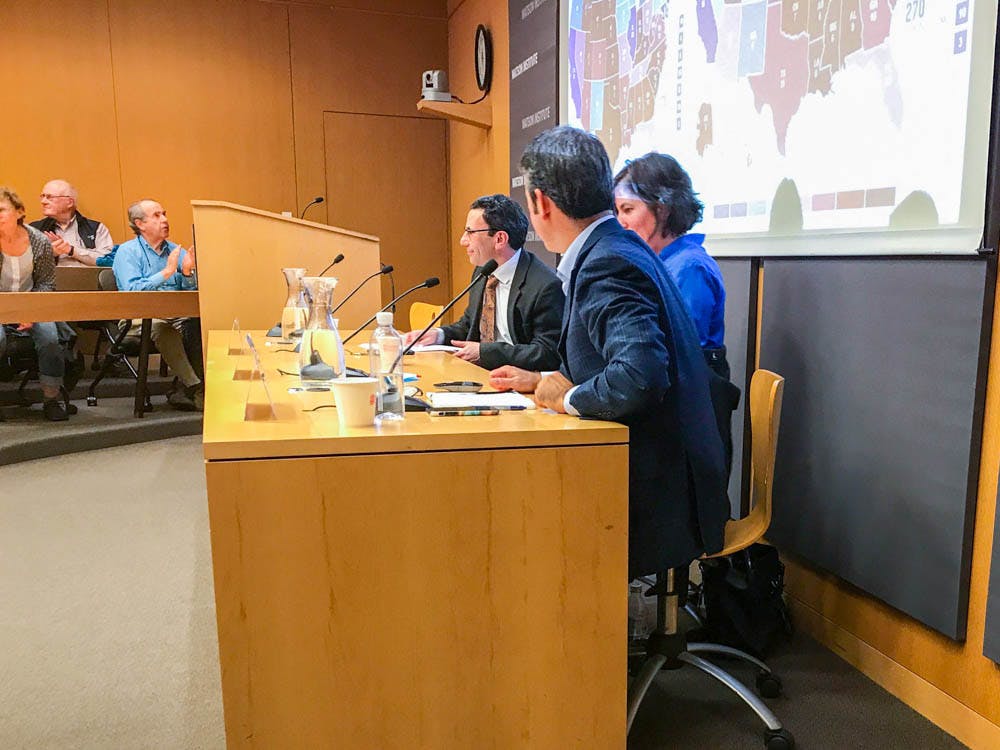As is the case with many modern political issues, Democrats and Republicans are divided on how they see the future of the United States under President Trump. In “Politics in the Age of Trump: the 2018 Midterms and Beyond,” a Democrat and Republican came together to discuss this topic.
The panel, which was moderated by Eric Patashnik, director of the public policy program, was held in the Watson Institute of International and Public Affairs’ Joukowsky Forum Monday. Jenny Backus ’90, a Democratic strategist and owner and president of political consulting firm Backus Consulting, and Brian Jones, a Republican strategist and partner at the Black Rock Group, discussed a myriad of topics concerning Trump’s past and future impact on their respective parties and what the parties should be doing to prepare for the future.
The two panelists began by posing one integral question to the audience: How did America get to where it is now?
Both sides are currently trying to answer this question, Jones said. The historical distrust Americans have of the government comes from the perception that the government does not work for the people, Backus said. This, in turn, has led to an increase in political polarization, as people only seek out political discussions with those they agree with. The resulting and ever-exacerbating dichotomy between red state and blue state is dangerous, she said.
There has also been an increase in distrust of the media since the 1990s, when a narrative that the media was not for the people arose, Jones said. This sort of political dissonance led to someone like Trump being able to enter the political sphere, he said.
The political battle with the media existed before Trump, Backus said. For example, Dick Cheney “waged war” on the New York Times, Backus said.
Someone like Trump is uniquely able to capitalize on today’s political divide when he combines his politics with a distrust in media, Jones said. Trump has been taking advantage of the media for 30 years, making him adept at doing so, he said.
Democrats underestimated his potential impact on the media, Backus said. Whereas Democrats struggled to become viral in the media, Trump mastered doing so with his “short, pithy sound bites that usually picked on someone else,” which were tailored to proliferate in the news, especially on Twitter, she added.
The 2018 midterm elections are uncertain for all of the parties, though the early ballots appear to be in the Democrats’ favor, Backus said. Influencing the upcoming election is what Backus calls the “M Factor”: the “Madman” in North Korea, Kim Jong Un; Robert Mueller, who is investigating any of Trump’s potential wrongdoings and John McCain, who is one of the lone Republicans to stand up against Trump, she said.
As far as the 2020 election is concerned, there is not a single candidate that is the clear frontrunner for either party, Backus said. She notes the instantaneity with which an election can change and said both parties need an Eisenhower-like candidate. An important mistake to avoid is running the same campaign as was ran in the last election cycle, she said.
Patashnik raised the question of whether or not traditional conservatism was still present within the Republican party. Whereas traditional conservatism stands for principals such as limited government and strong military, Trump seems to stand for different ones altogether, Jones said. As long as Trump is ascendant within the Republican party, this status will remain so, he said, binding many of the Republicans in Washington, D.C. in a “straight-jacket.” The Democrats, on the other hand, seem to have a “vacuum,” which they are waiting for someone to enter.
The candidate who convinces people that they care about them the most will win elections, Backus said. There have been certain parts of the country that feel as though they have been left behind, and, to them, Hillary Clinton represented this status quo. At the same time, Trump represented the candidate that would “break up” this paradigm, Jones said.
The panel then went into a question-and-answer section. One of the questions involved the difference between each party’s radical sides and how there can be discussions between both sides when there are no commonalities between the extremes. Backus responded that it is important not to conflate propaganda with Republican policies: While there are extreme or false claims coming from the right, these claims do not originate from within Congress. Elected officials should be separated from the “media machine.”





